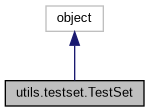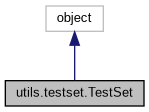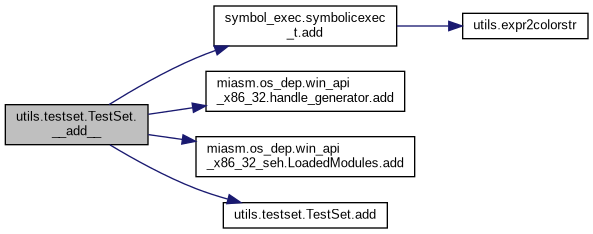|
| def | __init__ (self, base_dir) |
| |
| def | __add__ (self, test) |
| |
| def | add (self, test) |
| |
| def | set_cpu_numbers (self, cpu_c) |
| |
| def | set_callback (self, task_done=None, task_new=None) |
| |
| def | add_additional_args (self, args) |
| |
| def | run (self) |
| |
| def | end (self, clean=True) |
| |
| def | tests_passed (self) |
| |
| def | filter_tags (self, include_tags=None, exclude_tags=None) |
| |
◆ __init__()
| def utils.testset.TestSet.__init__ |
( |
|
self, |
|
|
|
base_dir |
|
) |
| |
Initialise a test set
@base_dir: base directory for tests
◆ __add__()
| def utils.testset.TestSet.__add__ |
( |
|
self, |
|
|
|
test |
|
) |
| |
◆ add()
| def utils.testset.TestSet.add |
( |
|
self, |
|
|
|
test |
|
) |
| |
◆ add_additional_args()
| def utils.testset.TestSet.add_additional_args |
( |
|
self, |
|
|
|
args |
|
) |
| |
Add arguments to used on the test command line
@args: list of str
◆ end()
| def utils.testset.TestSet.end |
( |
|
self, |
|
|
|
clean = True |
|
) |
| |
End a testset run
@clean: (optional) if set, remove tests products
PRE: run()
◆ fast_unify()
| def utils.testset.TestSet.fast_unify |
( |
|
seq, |
|
|
|
idfun = None |
|
) |
| |
|
static |
Order preserving unifying list function
@seq: list to unify
@idfun: marker function (default is identity)
◆ filter_tags()
| def utils.testset.TestSet.filter_tags |
( |
|
self, |
|
|
|
include_tags = None, |
|
|
|
exclude_tags = None |
|
) |
| |
Filter tests by tags
@include_tags: list of tags' name (whitelist)
@exclude_tags: list of tags' name (blacklist)
If @include_tags and @exclude_tags are used together, @exclude_tags will
act as a blacklist on @include_tags generated tests
◆ run()
| def utils.testset.TestSet.run |
( |
|
self | ) |
|
◆ set_callback()
| def utils.testset.TestSet.set_callback |
( |
|
self, |
|
|
|
task_done = None, |
|
|
|
task_new = None |
|
) |
| |
Set callbacks for task information retrieval
@task_done: function(Test, Error message)
@task_new: function(Test)
◆ set_cpu_numbers()
| def utils.testset.TestSet.set_cpu_numbers |
( |
|
self, |
|
|
|
cpu_c |
|
) |
| |
Set the number of cpu to use
@cpu_c: Number of CPU to use (default is maximum)
◆ tests_passed()
| def utils.testset.TestSet.tests_passed |
( |
|
self | ) |
|
◆ additional_args
| utils.testset.TestSet.additional_args |
◆ base_dir
| utils.testset.TestSet.base_dir |
◆ cpu_c
| utils.testset.TestSet.cpu_c |
◆ current_directory
| utils.testset.TestSet.current_directory |
◆ errorcode
| utils.testset.TestSet.errorcode |
◆ init_tests_number
| utils.testset.TestSet.init_tests_number |
◆ message_queue
| utils.testset.TestSet.message_queue |
◆ task_done_cb
| utils.testset.TestSet.task_done_cb |
◆ task_new_cb
| utils.testset.TestSet.task_new_cb |
◆ tests
| utils.testset.TestSet.tests |
◆ tests_done
| utils.testset.TestSet.tests_done |
◆ todo_queue
| utils.testset.TestSet.todo_queue |
◆ worker
| utils.testset.TestSet.worker = staticmethod(worker) |
|
static |
The documentation for this class was generated from the following file:
- /home/serpilliere/projet/test_doc_miasm/miasm/test/utils/testset.py







